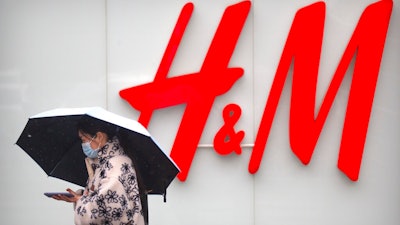
BEIJING (AP) — An American business group warned Tuesday that government-instigated consumer boycotts of foreign shoe, clothing and other brands in China are making companies less willing to invest.
That is adding to anxiety over Beijing’s plan for a list of “unreliable entities” that might be punished for actions deemed to run counter to Chinese interests, the American Chamber of Commerce in China said in an annual report on business conditions.
The report reflects growing unease among American and other foreign companies about the impact of economic and strategic tensions between Beijing and their home countries.
Brands including Swedish retailer H&M, Adidas and Nike have been targeted by demands online for consumer boycotts. That came after state media criticized them for expressing concern about reports of possible forced labor by ethnic minorities in the Xinjiang region of China’s northwest.
The American Chamber said 78% of companies that responded to its survey cited "rising tensions” between Beijing and Washington as their top concern.
Beijing announced plans for its “unreliable entities” list in 2019 after then-President Donald Trump blocked access to U.S. components and technology for Chinese tech giant Huawei Technologies Ltd. Officials have yet to say which companies might be on the list or disclose the criteria for being included.
Concern about the list is “aggravated by consumer boycotts instigated by official organizations and through Chinese media," the Chamber said. It said one in five companies expressed concern, while 7% said it was decreasing their willingness to invest.
Despite that, half the companies surveyed said China’s investment environment is improving, while 38% said it stayed the same. The Chamber said only 12% reported conditions had deteriorated, the lowest level since 2015.
The Chamber noted that 27% of information and computer technology companies said investment conditions were deteriorating, the highest level of any industry. That finding comes at a time when the ruling Communist Party is using subsidies, market barriers and informal pressure on companies to try to develop its own high-tech industries.






















